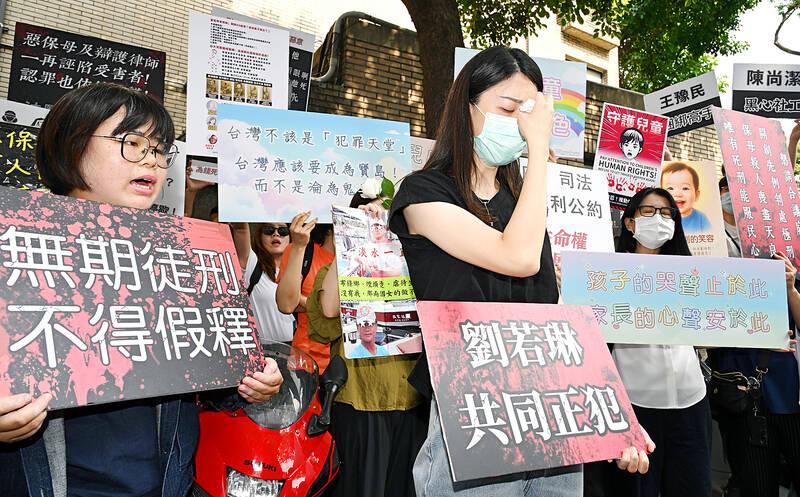The Ministry of Justice is considering increasing penalties for child abuse, including eliminating the potential of parole for cases resulting in the deaths of children under seven years old, Minister of Justice Cheng Ming-chien (鄭銘謙) said today.
Cheng was responding to questions from lawmakers about increasing penalties for child abuse, after two sisters were sentenced last month for causing the death of a one-year-old boy nicknamed Kai Kai (剴剴).
The Legislative Yuan’s Judiciary and Organic Laws Committee today invited officials from the Ministry of Justice and Judicial Yuan to give a report and answer questions about the factors that influence sentencing guidelines with regard to the death penalty.

Photo: Liao Chen-huei, Taipei Times
These factors include statements from the victims or relatives, the possibility of re-education or rehabilitation, and Article 57 of the Criminal Code, which lists 10 items that sentencing can take into account, such as motive, education level and the offender’s attitude after the crime.
Lawmakers cited the Kai Kai case as a reason to increase child abuse penalties, after an online petition on the matter received thousands of signatures.
The ministry held a consultation meeting with a criminal law research team yesterday and is to hold another tomorrow, soliciting opinions from all sectors, Cheng said.
However, any amendments proposed would increase penalties, he added.
The ministry has a “zero tolerance” view on child abuse, and would revise the law with this principle in mind, Cheng said.
The ministry is also considering eliminating the possibility of parole for those convicted of abuse for those under seven years old that results in the child’s death, he added.
Many of those who signed the petition want to see the Constitutional Court repeal its judgement on the death penalty handed down in September last year, Taiwan People's Party Chairman Huang Kuo-chang (黃國昌) said.
That judgement ruled that the death penalty is constitutional only for “the most serious” crimes that result in death.
Chinese Nationalist Party (KMT) Legislator Wu Tsung-hsien (吳宗憲) questioned the “vague wording” of the guidelines, and asked if there were standards for items such as potential for re-education.
This case touches on constitutional powers and previous judgements, Judicial Yuan Deputy Secretary-General Wang Mei-ying (王梅英) said, adding that the Judicial Yuan respects the rulings of the grand justices.

The manufacture of the remaining 28 M1A2T Abrams tanks Taiwan purchased from the US has recently been completed, and they are expected to be delivered within the next one to two months, a source said yesterday. The Ministry of National Defense is arranging cargo ships to transport the tanks to Taiwan as soon as possible, said the source, who is familiar with the matter. The estimated arrival time ranges from late this month to early next month, the source said. The 28 Abrams tanks make up the third and final batch of a total of 108 tanks, valued at about NT$40.5 billion

Two Taiwanese prosecutors were questioned by Chinese security personnel at their hotel during a trip to China’s Henan Province this month, the Mainland Affairs Council (MAC) said yesterday. The officers had personal information on the prosecutors, including “when they were assigned to their posts, their work locations and job titles,” MAC Deputy Minister and spokesman Liang Wen-chieh (梁文傑) said. On top of asking about their agencies and positions, the officers also questioned the prosecutors about the Cross-Strait Joint Crime-Fighting and Judicial Mutual Assistance Agreement, a pact that serves as the framework for Taiwan-China cooperation on combating crime and providing judicial assistance, Liang

A group from the Taiwanese Designers in Australia association yesterday represented Taiwan at the Midsumma Pride March in Melbourne. The march, held in the St. Kilda suburb, is the city’s largest LGBTQIA+ parade and the flagship event of the annual Midsumma Festival. It attracted more than 45,000 spectators who supported the 400 groups and 10,000 marchers that participated this year, the association said. Taiwanese Designers said they organized a team to march for Taiwan this year, joining politicians, government agencies, professionals and community organizations in showing support for LGBTQIA+ people and diverse communities. As the first country in Asia to legalize same-sex

MOTIVES QUESTIONED The PLA considers Xi’s policies toward Taiwan to be driven by personal considerations rather than military assessment, the Epoch Times reports Chinese President Xi Jinping’s (習近平) latest purge of the Chinese People’s Liberation Army (PLA) leadership might have been prompted by the military’s opposition to plans of invading Taiwan, the Epoch Times said. The Chinese military opposes waging war against Taiwan by a large consensus, putting it at odds with Xi’s vision, the Falun Gong-affiliated daily said in a report on Thursday, citing anonymous sources with insight into the PLA’s inner workings. The opposition is not the opinion of a few generals, but a widely shared view among the PLA cadre, the Epoch Times cited them as saying. “Chinese forces know full well that